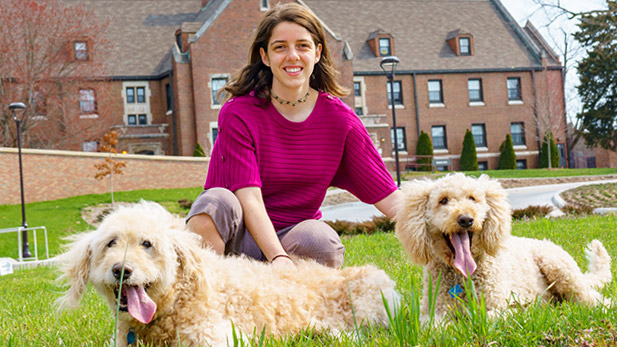Alumna Ariel Bohner Brings Her Rose-Hulman Research Experience to the National Institutes of Health

Alumna Ariel Bohner is working as a research fellow at the National Institutes of Health, studying how white blood cells respond to medicines that fight inflammation. She hopes her research experience can help both humans and animals with arthritis.
When Ariel Bohner graduated from Rose-Hulman in 2019 with a joint degree in biology and biomathematics, she never anticipated working as a research fellow at the National Institutes of Health (NIH) only a few years after college. But that’s exactly what she’s doing, and Bohner credits her undergraduate experience at Rose-Hulman with helping her realize that achievement.
“At Rose, I had great mentors who encouraged me to pursue research and I ended up falling in love with research,” Bohner says. “With their support, I started the veterinary program but continued to look for programs that would allow me to do research that would fit within my dream of being a vet.”
Bohner is halfway through her tenure at Cornell University School of Veterinary Medicine with plans to graduate in 2024. She is currently taking a gap year to participate in the NIH’s Medical Research Scholar Program Fellowship for students in medicine, dental or veterinary schools. The experience allows students to explore a hands-on research project in a lab setting while working with an NIH mentor.
Bohner’s NIH research project focuses on the different ways white blood cells respond to glucocorticoids, which are powerful medicines that fight inflammation, but often cause myriad side effects in the user. She is particularly excited that her research project focuses on a problem both humans and animals face.
“We’ve been using steroids for more than 70 years, but we don’t know why they cause all these side effects,” Bohner says. “My lab examines how steroids affect these cells. White blood cells in humans and animals respond the same way. Being able to work on this project helps the human medicine world and veterinary medicine world.”
As an undergraduate student at Rose, Bohner investigated canine arthritis after noticing one of her dogs struggling to play. That project helped her understand the entire research process, from going from a question to developing an experiment to writing it up into a thesis.
Bohner took the love of research she found at Rose to veterinary school. She began working with a researcher at Cornell who is an orthopedic surgeon for horses. Together, they are focusing on the issue of injury-induced arthritis in animals.
“It’s really neat to see the progression of research, to have an initial question at Rose of ‘How does this work?’ to now understanding, ‘Oh wait, this explains why it works’,” Bohner says. “Getting to that point where you know you’re contributing and making something that other people can use to take the work further is really exciting.”
Bohner credits her double major in biology and biomathematics as a big reason for her admission to graduate school and securing a research position at the NIH, and finds her degrees extremely beneficial as she progresses toward future career endeavors.
“It was very helpful to have that background in biology before I took on medicine projects,” Bohner says. “The biomathematics major has allowed me to see biological systems from a more analytical or mathematical aspect. And I can contribute a skill set to my projects and research that not many others have who simply studied biology.”
“I also believe having the dual major helped me get into veterinary school as well. Vet school admission is very competitive … having something that set me apart from general biology or premed majors really helped. And Rose is well known for teaching their students well and I performed well too.”
Bohner is keeping her future career endeavors open and wants to see where her current opportunities take her. However, she knows for certain she will be a veterinarian and research will be part of whatever road she travels.
“I want to apply the skills I learn to help animals in this world and I’m grateful the initial encouragement at Rose started me on this path,” she says.